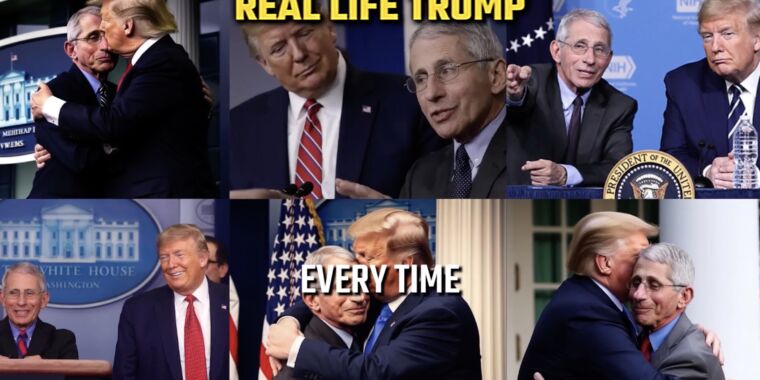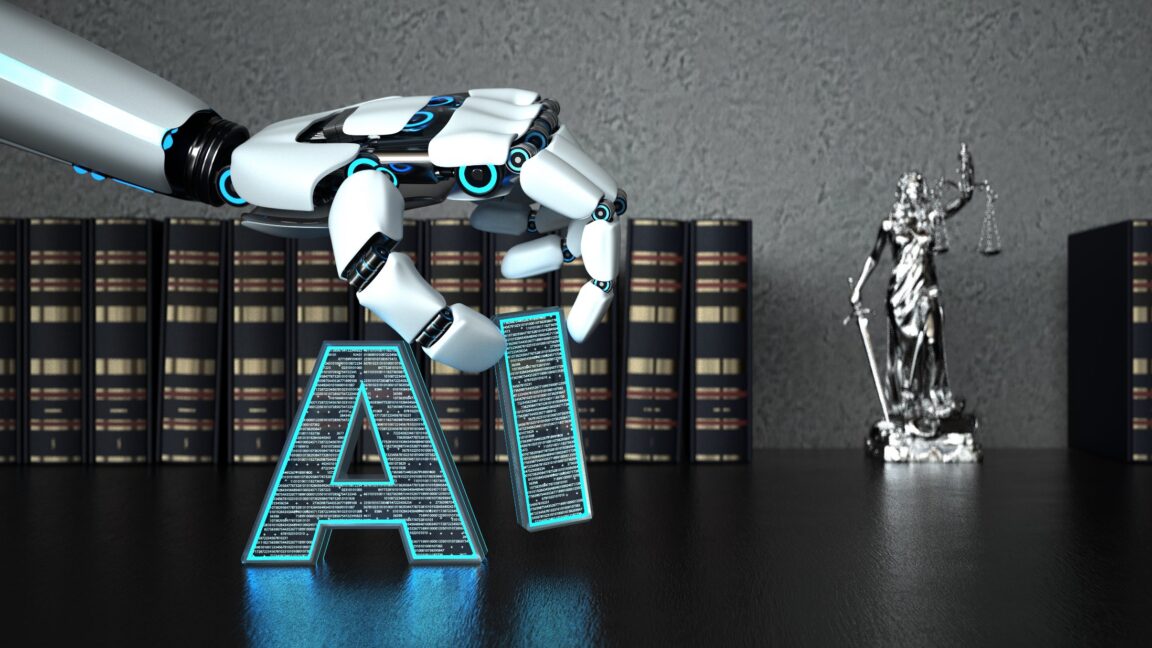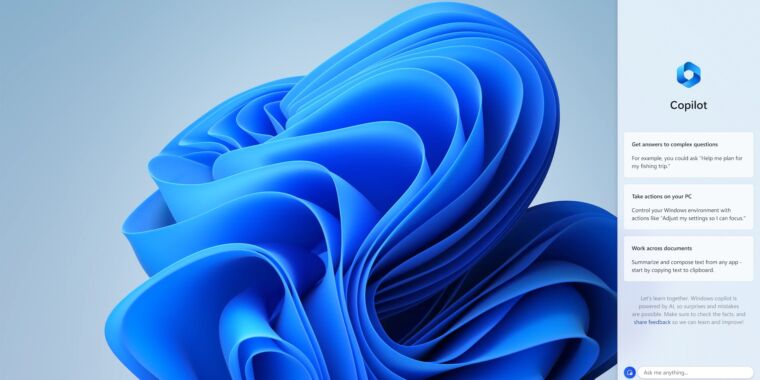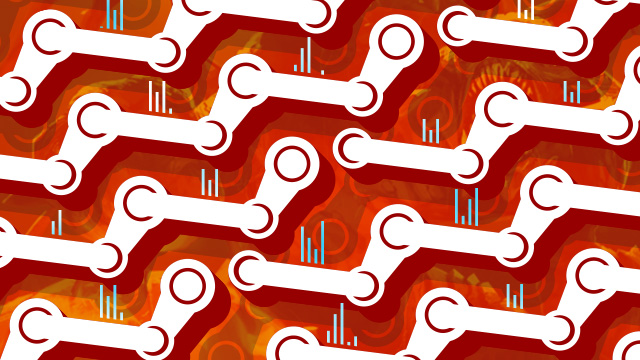- Joined
- Sep 26, 2021
- Posts
- 8,026
- Main Camera
- Sony
Also do not piss on the robe.do not piss off the robe
Also do not piss on the robe.do not piss off the robe

Shit, throw a little AI in there and we may have a solution to end the energy crisis.

 arstechnica.com
arstechnica.com
Huh I was wondering if the judge was going to recommend to the state bar that they be disbarred after his questioning.$5000 fine for using ChatGPT to (unknowingly) create bogus cases. I think they got off easy.

Lawyers have real bad day in court after citing fake cases made up by ChatGPT
Lawyers fined $5K and lose case after using AI chatbot "gibberish" in filings.arstechnica.com
Copilot will also launch with Bing ads right out of the gate. Microsoft will serve you ads that the company thinks is relevant.

Hopefully "Copilot" will be less annoying that that damn paperclip.
While less of an issue for your partner and more of one for your niece, one of several reasons why AI companies don’t want to reveal their training data is an issue of copyright. From programming to art to writing, much of what the models were trained on is probably copyrighted - at one point does the owner of that copyright make claims against the product of a prompt or the tool itself? This is in of course in addition to the highly related legal question of who owns the product of a prompt? It’s going to get very interesting in the legal regulatory space.My partner manages a cancer treatment team and arrived home some two weeks ago having discovered some of her staff were using ChatGPT to create emails, and “we might as well embrace it”. I pointed out the risks around its tendency to hallucinate and sent her several articles and a paper for her senior team to discuss, resulting in a policy for its responsible use which includes always checking any ‘factual’ claims it might make and always reviewing and revising to make sure its ‘style’ and ‘tone’ is appropriate. Also emphasised is not to upload any patient, staff or other personal information in crafting prompts
So here we are. As @Colstan points out, (narrow) AI is steadily making its way in the real world
Several points have occurred to me recently from some of the memorable discussion in this thread. I wasn’t sure they were worth committing to a post but…well, anyway!
1. @dada_dave mentioned will and @Huntn - always quick to identify the big questions! - consciousness
There’s quite a lot to say around this, but a quick reduction is that if AI, modelled as it is on our imperfect understanding of the brain, is at all a good approximation of how our brains do their work, then we can run this in reverse as well. Among possibilities that might apply to both is that neural networks might be non-linear and chaotic ie deterministic yet unpredictable
This suggests that inputs in an ‘always-on’ learning system will (a) not give the same output twice (b) may not ‘know’ or be able to reproduce how it arrives at a particular output. My suggestion? That a conscious human - and a conscious AI if such a thing ever arises - might experience these unpredictable outputs as the operation of ‘free will’…
2. @Yoused made superb points about the difference between AI and human thought. One that struck me particularly is the multi-sensory advantage humans (and other animals) currently enjoy over AI. Right now, human (long-term) memory is organized in much more complex ways than that of an AI because our links are built using - yes words - but also images, smells, tastes, touch. The neural pathways between our memories are richer and more elaborate
To the extent that our everyday outputs depend on these things - this might most obviously apply with artists and writers and so on, but given the unpredictability suggested above it might apply in non-obvious professions too - we have a significant creative advantage in the (sensory) inputs we experience and the links we are able to make. Some of these would ‘baffle’ an AI restricted to words and even images…right now
Since my partner’s turn to ’the dark side’I’ve given ChatGPT another trial, and it seems to have improved a lot from where it was in December, almost an acceptable assistant now. It definitely falls well short of creative insight - which I’ll loosely define as the ability to make large leaps that suddenly simplify what was previously complicated and obscure - yet I can see that its foundation in a large literature of internet-accessible human writings (and images) may make it a genuinely useful starting and debating point in longer creative processes
My reservation is that LLMs right now may suffer from a certain ‘poverty‘ in their outputs (back to Yoused’s point). @Nycturne (who made some great posts addressing other points in this thread BTW) and @Andropov and I discussed ChatGPT some months ago in the swift thread, and Androprov noted something along these lines in the style of email produced by LLMs (via some of Andropov’s colleages IIRC)
Many decades ago humans’ ability to do long arithmetic calculations got a large shot in the arm with the invention of the personal calculator. Recently, I’ve started to think of LLMs as the verbal counterpart of the personal calculator
As to the image production side of all this? @Eric and @Citysnaps might care to comment?
I have a young, artistically talented niece who two years ago was heading into an exciting career as a graphic artist. While enthused about the capabilities of AI, her career options - especially being young and at the bottom - don’t look good right now. However, she has the kind of smarts I hope will see her find a fulfilling niche somewhere in this interesting new world!
Lots to unpack in your well thought out post but let me touch on my thoughts on the photography side of things.As to the image production side of all this? @Eric and @Citysnaps might care to comment?
I have a young, artistically talented niece who two years ago was heading into an exciting career as a graphic artist. While enthused about the capabilities of AI, her career options - especially being young and at the bottom - don’t look good right now. However, she has the kind of smarts I hope will see her find a fulfilling niche somewhere in this interesting new world!

As to the image production side of all this? @Eric and @Citysnaps might care to comment?
There’s probably a market for visually striking/appealing/unusual/dramatic/etc photographs in the same vein as there is for paintings. “Painter of Light” Thomas Kinkade comes to mind. If Kinkade were still alive he’d be all over AI and be making a ton of money cranking out the kind of paintings that many people found appealing.
I think most photographers would eschew any photographic work that does not involve a photographer, his/her eye and imagination, a camera, and interesting subject matter.

I have a hard time believing an AI could come up with

Developer claims Steam is rejecting games with AI-generated artwork
Valve cites unclear legal status, copyrighted training data in rejection message.
My opinion:My partner manages a cancer treatment team and arrived home some two weeks ago having discovered some of her staff were using ChatGPT to create emails, and “we might as well embrace it”. I pointed out the risks around its tendency to hallucinate and sent her several articles and a paper for her senior team to discuss, resulting in a policy for its responsible use which includes always checking any ‘factual’ claims it might make and always reviewing and revising to make sure its ‘style’ and ‘tone’ is appropriate. Also emphasised is not to upload any patient, staff or other personal information in crafting prompts
So here we are. As @Colstan points out, (narrow) AI is steadily making its way in the real world
Several points have occurred to me recently from some of the memorable discussion in this thread. I wasn’t sure they were worth committing to a post but…well, anyway!
1. @dada_dave mentioned will and @Huntn - always quick to identify the big questions! - consciousness
There’s quite a lot to say around this, but a quick reduction is that if AI, modelled as it is on our imperfect understanding of the brain, is at all a good approximation of how our brains do their work, then we can run this in reverse as well. Among possibilities that might apply to both is that neural networks might be non-linear and chaotic ie deterministic yet unpredictable
This suggests that inputs in an ‘always-on’ learning system will (a) not give the same output twice (b) may not ‘know’ or be able to reproduce how it arrives at a particular output. My suggestion? That a conscious human - and a conscious AI if such a thing ever arises - might experience these unpredictable outputs as the operation of ‘free will’…
2. @Yoused made superb points about the difference between AI and human thought. One that struck me particularly is the multi-sensory advantage humans (and other animals) currently enjoy over AI. Right now, human (long-term) memory is organized in much more complex ways than that of an AI because our links are built using - yes words - but also images, smells, tastes, touch. The neural pathways between our memories are richer and more elaborate
To the extent that our everyday outputs depend on these things - this might most obviously apply with artists and writers and so on, but given the unpredictability suggested above it might apply in non-obvious professions too - we have a significant creative advantage in the (sensory) inputs we experience and the links we are able to make. Some of these would ‘baffle’ an AI restricted to words and even images…right now
Since my partner’s turn to ’the dark side’I’ve given ChatGPT another trial, and it seems to have improved a lot from where it was in December, almost an acceptable assistant now. It definitely falls well short of creative insight - which I’ll loosely define as the ability to make large leaps that suddenly simplify what was previously complicated and obscure - yet I can see that its foundation in a large literature of internet-accessible human writings (and images) may make it a genuinely useful starting and debating point in longer creative processes
My reservation is that LLMs right now may suffer from a certain ‘poverty‘ in their outputs (back to Yoused’s point). @Nycturne (who made some great posts addressing other points in this thread BTW) and @Andropov and I discussed ChatGPT some months ago in the swift thread, and Androprov noted something along these lines in the style of email produced by LLMs (via some of Andropov’s colleages IIRC)
Many decades ago humans’ ability to do long arithmetic calculations got a large shot in the arm with the invention of the personal calculator. Recently, I’ve started to think of LLMs as the verbal counterpart of the personal calculator
As to the image production side of all this? @Eric and @Citysnaps might care to comment?
I have a young, artistically talented niece who two years ago was heading into an exciting career as a graphic artist. While enthused about the capabilities of AI, her career options - especially being young and at the bottom - don’t look good right now. However, she has the kind of smarts I hope will see her find a fulfilling niche somewhere in this interesting new world!

The equivalent of having your dildo talking to you. “Oh baby, your so hot!!”.This sex toy company uses ChatGPT to whisper sweet, customizable fantasies at you

This sex toy company uses ChatGPT to whisper sweet, customizable fantasies at you | TechCrunch
Lovense — perhaps best known for its remote-controllable sex toys — this week announced its ChatGPT Pleasure Companion.techcrunch.com
This site uses cookies to help personalise content, tailor your experience and to keep you logged in if you register.
By continuing to use this site, you are consenting to our use of cookies.
